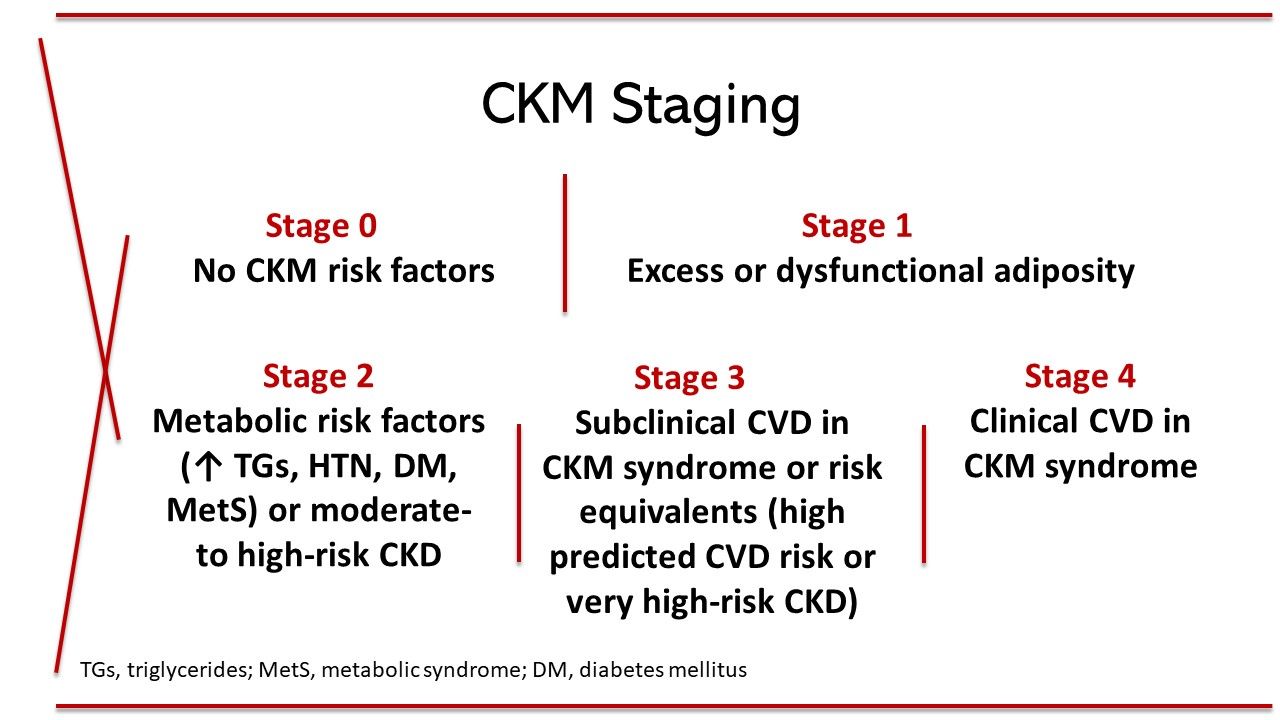- Clinical Technology
- Adult Immunization
- Hepatology
- Pediatric Immunization
- Screening
- Psychiatry
- Allergy
- Women's Health
- Cardiology
- Pediatrics
- Dermatology
- Endocrinology
- Pain Management
- Gastroenterology
- Infectious Disease
- Obesity Medicine
- Rheumatology
- Nephrology
- Neurology
- Pulmonology
Cardiovascular-Kidney-Metabolic (CKM) Syndrome Affects Nearly All US Adults
The majority of the US adult population meets criteria for subclinical CKM syndrome indicating "an urgent need for population-wide risk reduction measures."
More than three-quarters of US adults have stage 1 to 3 cardiovascular-kidney-metabolic (CKM) syndrome, including individuals without evidence of clinical cardiovascular disease (CVD), according to findings published as a research letter in the Journal of the American College of Cardiology. Among adults aged 65 years and older only 1.8% met criteria for CKM stage 0.1
The proportion of individuals with CKM stage 0, or no CKM syndrome risk factors, was 17.35% among those aged 20 to 44 years and 5.45% among those aged 45 to 64 years, Abdul Mannan Khan Minhas, MD, clinical fellow in preventive cardiology at Baylor College of Medicine, in Houston, Texas, and colleagues reported, underscoring the rapid acceleration of risk factor development with age.1
The disease entity cardiovascular metabolic kidney syndrome, owes its naming to a tipping point in the medical and scientific communities' deepening appreciation for the connections among the diseases and for their combined impact on cardiovascular mortality. The framework for CMK syndrome was introduced by the American Heart Association in October 2023 and includes CKM staging and corresponding screening approaches.2

Minhas and fellow researchers looked to move beyond knowledge of the prevalence of the individual CKM comorbidities and of clinical CVD and designed the current study to estimate the prevalence of each stage of CKM syndrome.1
For their data, the investigators tapped 4 National Health and Nutrition Examination Survey (NHANES) cycles from 2011 to 2018 including adults aged 20 years and older and excluding pregnant women. All information on CVD and other comorbidities was extracted from standardized NHANES questionnaires and records of laboratory and physical examinations.1
Minhas et al identified weighted percentages for prevalence of each CKM stage among cohorts identified by age, sex, race and ethnicity.

“The high prevalence of multimorbidity that defines the newly described CKM syndrome highlights the urgent need for public health intervention to optimize the health of individuals in the United States,” the researchers wrote. “Understanding the burden of interrelated comorbidities and convergence of risk factors is important for public health efforts behind the identification and management of the CKM syndrome, particularly given the increasing number of therapeutic management options for these conditions. Such efforts may include targeted screening and prevention efforts among individuals with early stages of the CKM syndrome to prevent progression to higher stages and symptomatic CVD.”1
For more details on Cardiovascular-Kidney-Metabolic Health: A Presidential Advisory From the American Heart Association see:
AHA Defines Cardiovascular-Kidney-Metabolic Syndrome, Redefines CVD Risk, Prevention, Management
For interviews with Chiadi Ndumele, MD, PhD, MHS, chair of the writing committee for the AHA’s scientific statement on prevention and management of CKM syndrome and associate professor of medicine and director of obesity and cardiometabolic research in the division of cardiology at Johns Hopkins University, please see:
"CKM Syndrome" Defines a Very Wide Target and Medicine is Ready, Says Chiadi Ndumele, MD, PhD, MHS
The 4 Stages of CKM Syndrome Offer Opportunities to Stop Progression, Promote Regression
Primary Care is the Quarterback in Effective Care for Cardiovascular-Kidney-Metabolic Syndrome
How to Build Assessment for Cardiovascular-Kidney-Metabolic Syndrome into Primary CVD Prevention
